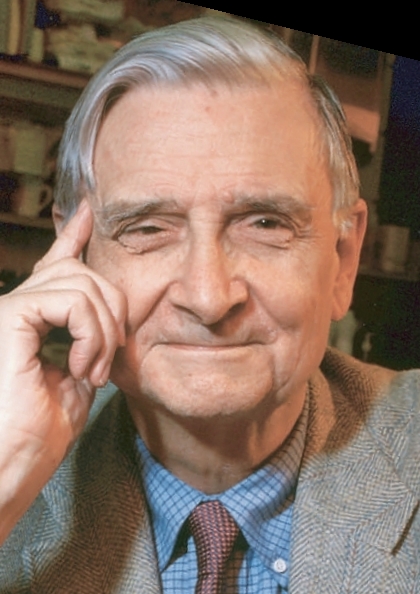Obras
Consilience
Edward Osborne WilsonOn Human Nature
Edward Osborne WilsonFrases célebres de Edward Osborne Wilson
Fuente: Edward O. Wilson: The Diversity of Life (1999), 259
Fuente: Edward O. Wilson: Dilemma'. On Human Nature (1978, 1979), 2.
“Este planeta puede ser un paraíso en el siglo XXII.”
Fuente: Declaración cuando le concedieron el "TED Prize" http://ted.com/tedprize/winners2007.cfm, que ganó en 2007.
Fuente: Consilience: The Unity of Knowledge (1998, 1999), 286. Citado en: Citas de Edward O. Wilson (en inglés) http://www.todayinsci.com/W/Wilson_Edward/WilsonEdward-Quotations.htm. Today in Science History.
Edward Osborne Wilson Frases y Citas
Fuente: Citado en: R.Z. Sheppard, Nature: Splendor in The Grass, Time (3 de septiembre de 1990).
“Teoría maravillosa, especie equivocada.”
Sobre el marxismo, que consideraba más adecuado para las hormigas que para los humanos.
Fuente: http://arts.independent.co.uk/books/news/article2886394.ece
Fuente: Citado en: Jamie Murphy y Andrea Dorfman, The Quiet Apocalypse, Time (13 de octubre de 1986).
Fuente: Can biology do better than faith? http://www.newscientist.com/article/dn8254-can-biology-do-better-than-faith.html. NewScientist.com, 02 de noviembre de 2005. Consultado el 26-10-2010.
Edward Osborne Wilson: Frases en inglés
“We have Paleolithic emotions, medieval institutions, and god-like technology.”
Fuente: debate at the Harvard Museum of Natural History, Cambridge, Mass., 9 September 2009
Can biology do better than faith?, NewScientist.com, 2 November 2005, 2010-10-26 http://www.newscientist.com/article/dn8254-can-biology-do-better-than-faith.html,
“True character arises from a deeper well than religion.”
Consilience: The Unity of Knowledge (1998)
Contexto: True character arises from a deeper well than religion. It is the internalization of moral principles of a society, augmented by those tenets personally chosen by the individual, strong enough to endure through trials of solitude and adversity. The principles are fitted together into what we call integrity, literally the integrated self, wherein personal decisions feel good and true. Character is in turn the enduring source of virtue. It stands by itself and excites admiration in others. It is not obedience to authority, and while it is often consistent with and reinforced by religious belief, it is not piety.
Fuente: Consilience: The Unity of Knowledge (1998), p. 277-278.
Contexto: Few will doubt that humankind has created a planet-sized problem for itself. No one wished it so, but we are the first species to become a geophysical force, altering Earth's climate, a role previously reserved for tectonics, sun flares, and glacial cycles. We are also the greatest destroyer of life since the ten-kilometer-wide meteorite that landed near Yucatan and ended the Age of Reptiles sixty-five million years ago. Through overpopulation we have put ourselves in danger of running out of food and water. So a very Faustian choice is upon us: whether to accept our corrosive and risky behavior as the unavoidable price of population and economic growth, or to take stock of ourselves and search for a new environmental ethic.
“Wonderful theory, wrong species.”
On Marxism, which he considered more suited to ants than to humans.
http://arts.independent.co.uk/books/news/article2886394.ece.
Fuente: Consilience: The Unity of Knowledge (1998), p. 294.
“Karl Marx was right, socialism works, it is just that he had the wrong species”
Fuente: The Ants
Fuente: Consilience: The Unity of Knowledge
“Much of good science — and perhaps all of great science — has its roots in fantasy.”
Fuente: Letters to a Young Scientist (2013), chapter 5, "The Creative Process", page 69.
“The mosquito is an automaton. It can afford to be nothing else.”
On Human Nature (1978), Ch.3 Development
http://www.independent.co.uk/news/science/why-richard-dawkins-is-no-scientist-the-survival-of-the-least-selfish-and-what-ants-can-tell-us-about-humans-eo-wilson-on-his-new-book-the-meaning-of-human-existence-9849956.html
